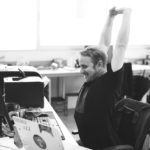During interviews, I’m often asked, “What’s the one strategy from Think Like a Rocket Scientist that you personally use most often?”
It’s called backcasting.
For most of us, planning for the future means forecasting. In our businesses, we review the current supply and demand for widgets and extrapolate them into the future. In our personal lives, we let our current skill set drive our vision for who we might become.
With forecasting, we look in the rearview mirror, rather than the possibilities ahead. When we forecast, we ask, “What can we do with what we have?” But often, the status quo itself is part of the problem. Forecasting takes all our problematic assumptions and propels them into the future. It artificially restricts our vision of what’s feasible.
Backcasting flips the script. Rather than forecasting the future, backcasting aims to determine how an imagined future can be attained.
I’ve used backcasting for most of my life—as early as middle school (though I didn’t know what to call it back then).
When I was growing up in Istanbul, my moonshot was to become an astronaut one day. I decided to work backward from my ideal future to figure out exactly what I needed to do to get there.
The year was 1995. The internet had just arrived at my school, and it was excruciatingly slow. It would take 4 minutes just to load the Yahoo! home page.
Mustering all the patience I could find, I researched the background of every astronaut who had ever worked at NASA. My goal was to identify what NASA was looking for in picking its astronaut corps. I found out, for example, that most civilian astronauts had advanced degrees in science or engineering from a prestigious university in the United States.
I then worked backward from that goal. I researched how to get into college in the United States. I learned English as a second language. I borrowed every SAT and TOEFL prep book I could get my hands on. I taught myself computer programming (C++), thinking it would be another useful tool in my arsenal.
I was eventually admitted to Cornell University to study astrophysics and ended up serving on the 2003 Mars Exploration Rovers mission. I went from daydreaming about space in Turkey to having front row seats to the action.
I didn’t get my moonshot of becoming an astronaut (at least not yet—nudge, nudge, Elon and Jeff). But I got to work on one of the most successful interplanetary missions of all time. If I wasn’t aiming high, and if I hadn’t applied backcasting to sketch out a concrete plan for getting there, I wouldn’t have ended up where I am today.
Backcasting can be applied to just about anything.
Determine what you want and move back from that ideal future.
What do you want your life to look like? Work backward from that.
What does an ideal product look like for your business? Visualize a customer delighted with that product and sketch out a roadmap to get there.
Instead of letting your existing reality drive your vision, let your vision drive your reality.
When we forecast the future, we try to predict it.
When we backcast the future, we create it.
P.S. Backcasting is one of the many strategies I cover in my presentations on how to reimagine the status quo. If you’ve got a virtual or in-person event coming up, you can learn more about my speaking and submit a booking request at this link.
My previous events include keynotes at Microsoft, Adidas, General Electric, Google X, Salesforce, among many others. Here’s what others are saying:
“Ozan’s talk resonated with our employees so well that people continually referenced Ozan and ‘moonshots’ for not only days but weeks afterwards! Highly recommend him a speaker.” —Kevin Mullins, Workhuman
“Ozan’s presentation was fantastic – his content is thought provoking, challenging and compelling, packed with pertinent examples to bring his concepts to life. I wouldn’t hesitate to recommend Ozan as a speaker and author for teams looking to improve and challenge how they work and think.” —Jody Lewis, Lloyds Bank
“Ozan speaks with ease and keeps his audience intrigued and engaged. His stories are fantastic. Book him. You won’t regret it.” —Anika Hedstrom, Vista Capital Partners
“I felt like I was watching a live TED talk.” — Mark Whalen, VP, Schikel Corporation
Bold



